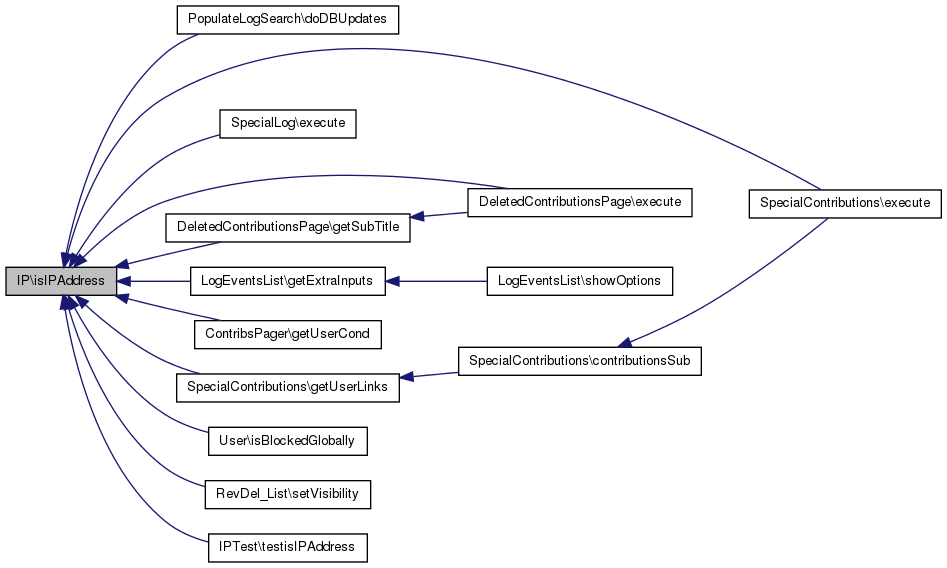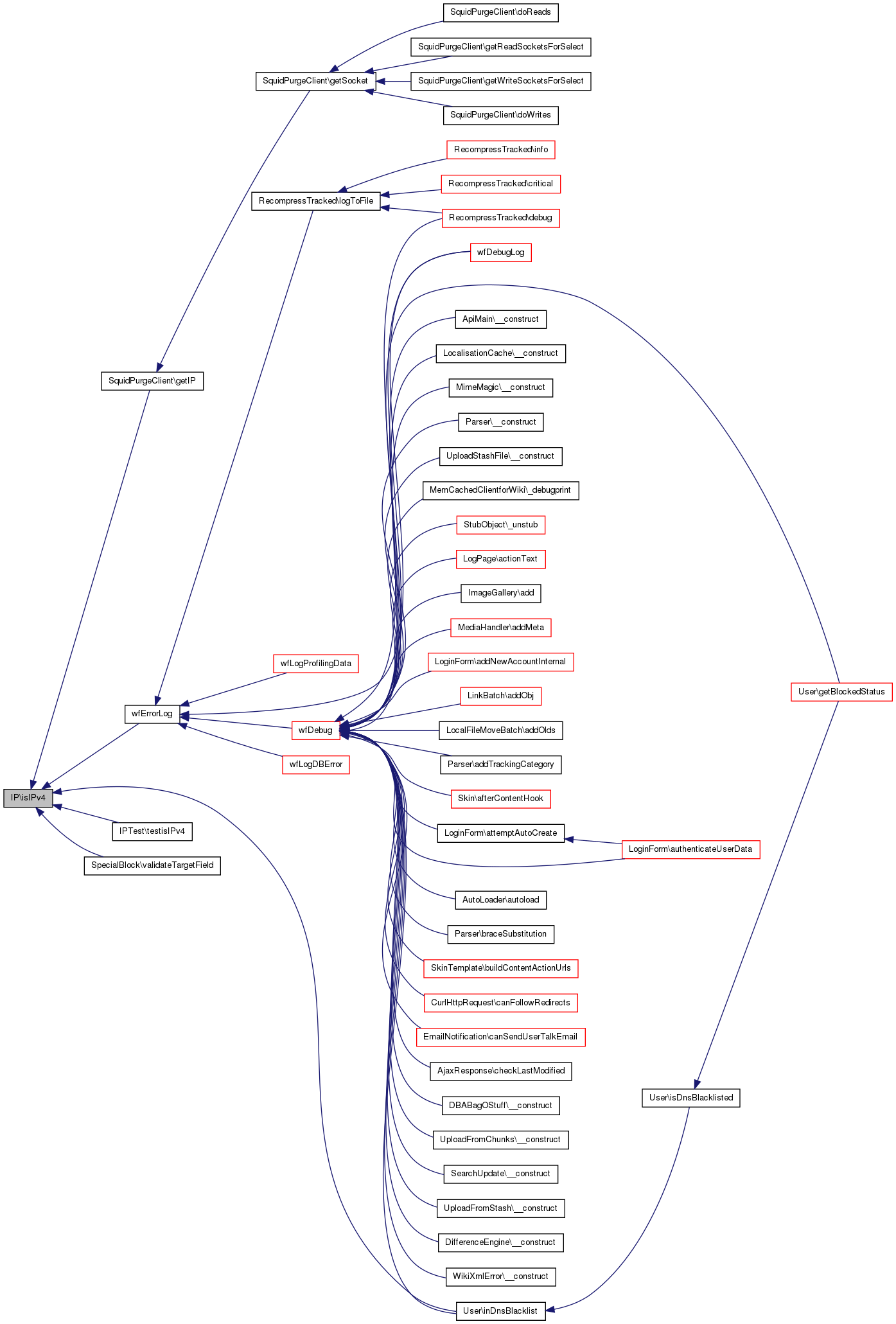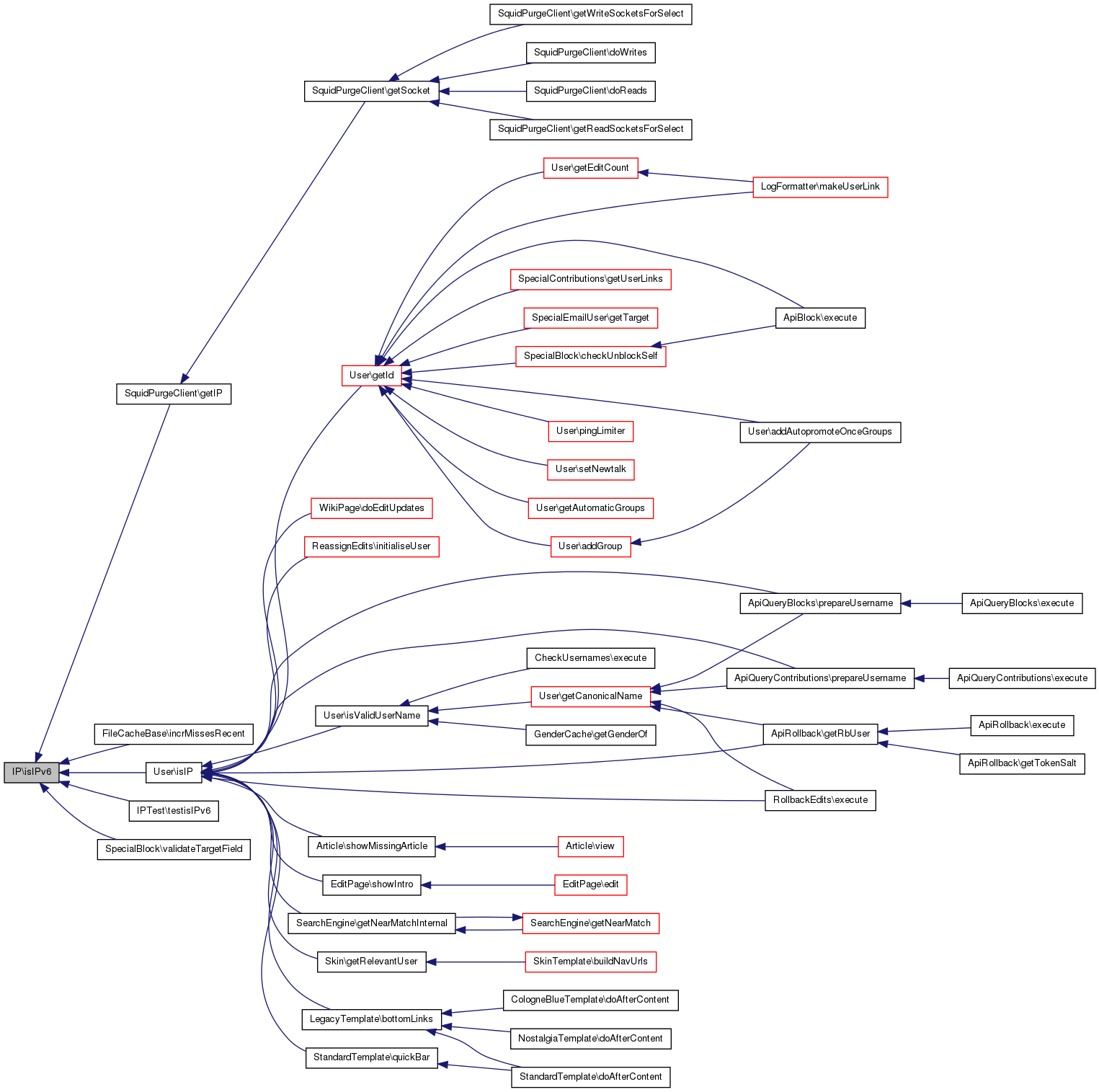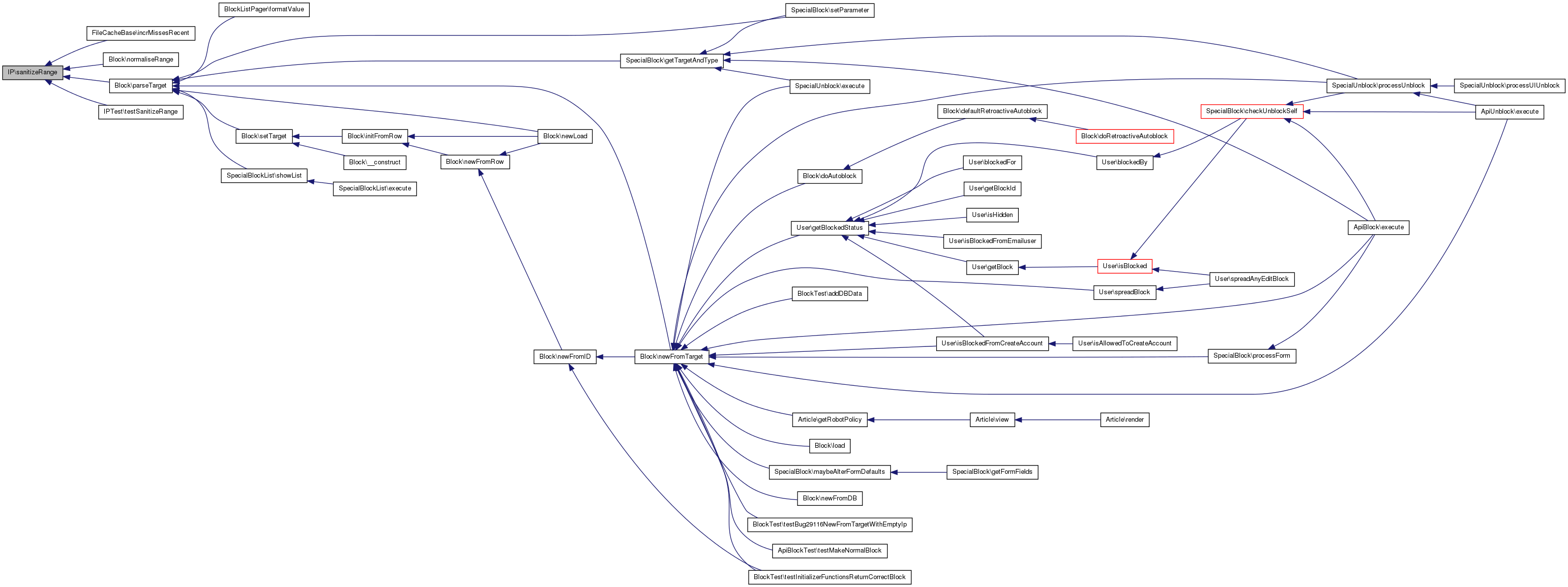A collection of public static functions to play with IP address and IP blocks. More...
Static Public Member Functions | |
| static | canonicalize ($addr) |
| Convert some unusual representations of IPv4 addresses to their canonical dotted quad representation. | |
| static | combineHostAndPort ($host, $port, $defaultPort=false) |
| Given a host name and a port, combine them into host/port string like you might find in a URL. | |
| static | formatHex ($hex) |
| Convert an IPv4 or IPv6 hexadecimal representation back to readable format. | |
| static | hexToOctet ($ip_hex) |
| Converts a hexadecimal number to an IPv6 address in octet notation. | |
| static | hexToQuad ($ip_hex) |
| Converts a hexadecimal number to an IPv4 address in quad-dotted notation. | |
| static | isInRange ($addr, $range) |
| Determine if a given IPv4/IPv6 address is in a given CIDR network. | |
| static | isIPAddress ($ip) |
| Determine if a string is as valid IP address or network (CIDR prefix). | |
| static | isIPv4 ($ip) |
| Given a string, determine if it as valid IP in IPv4 only. | |
| static | isIPv6 ($ip) |
| Given a string, determine if it as valid IP in IPv6 only. | |
| static | isPublic ($ip) |
| Determine if an IP address really is an IP address, and if it is public, i.e. | |
| static | isValid ($ip) |
| Validate an IP address. | |
| static | isValidBlock ($ipblock) |
| Validate an IP Block (valid address WITH a valid prefix). | |
| static | parseCIDR ($range) |
| Convert a network specification in CIDR notation to an integer network and a number of bits. | |
| static | parseRange ($range) |
| Given a string range in a number of formats, return the start and end of the range in hexadecimal. | |
| static | sanitizeIP ($ip) |
| Convert an IP into a nice standard form. | |
| static | sanitizeRange ($range) |
| Gets rid of uneeded numbers in quad-dotted/octet IP strings For example, 127.111.113.151/24 -> 127.111.113.0/24. | |
| static | splitHostAndPort ($both) |
| Given a host/port string, like one might find in the host part of a URL per RFC 2732, split the hostname part and the port part and return an array with an element for each. | |
| static | toHex ($ip) |
| Return a zero-padded upper case hexadecimal representation of an IP address. | |
| static | toOctet ($ip_int) |
| Given an unsigned integer, returns an IPv6 address in octet notation. | |
| static | toUnsigned ($ip) |
| Given an IP address in dotted-quad/octet notation, returns an unsigned integer. | |
Static Private Member Functions | |
| static | IPv6ToRawHex ($ip) |
| Given an IPv6 address in octet notation, returns a pure hex string. | |
| static | isPublic6 ($ip) |
| Determine if an IPv6 address really is an IP address, and if it is public, i.e. | |
| static | parseCIDR6 ($range) |
| Convert a network specification in IPv6 CIDR notation to an integer network and a number of bits. | |
| static | parseRange6 ($range) |
| Given a string range in a number of formats, return the start and end of the range in hexadecimal. | |
| static | toUnsigned6 ($ip) |
Detailed Description
Member Function Documentation
| static IP::canonicalize | ( | $ | addr | ) | [static] |
Convert some unusual representations of IPv4 addresses to their canonical dotted quad representation.
This currently only checks a few IPV4-to-IPv6 related cases. More unusual representations may be added later.
- Parameters:
-
$addr String: something that might be an IP address
- Returns:
- String: valid dotted quad IPv4 address or null
Definition at line 671 of file IP.php.
Referenced by IPTest\testIPCanonicalizeMappedAddress(), and IPTest\testIPCanonicalizeOnValidIp().

| static IP::combineHostAndPort | ( | $ | host, |
| $ | port, | ||
| $ | defaultPort = false |
||
| ) | [static] |
Given a host name and a port, combine them into host/port string like you might find in a URL.
If the host contains a colon, wrap it in square brackets like in RFC 2732. If the port matches the default port, omit the port specification
- Parameters:
-
$host string $port int $defaultPort bool|int
- Returns:
- string
Definition at line 250 of file IP.php.
Referenced by WebRequest\detectServer(), and IPTest\testCombineHostAndPort().

| static IP::formatHex | ( | $ | hex | ) | [static] |
| static IP::hexToOctet | ( | $ | ip_hex | ) | [static] |
Converts a hexadecimal number to an IPv6 address in octet notation.
- Parameters:
-
$ip_hex String: pure hex (no v6- prefix)
- Returns:
- String (of format a:b:c:d:e:f:g:h)
Definition at line 291 of file IP.php.
Referenced by IPTest\testHexToOctet().

| static IP::hexToQuad | ( | $ | ip_hex | ) | [static] |
Converts a hexadecimal number to an IPv4 address in quad-dotted notation.
- Parameters:
-
$ip_hex String: pure hex
- Returns:
- String (of format a.b.c.d)
Definition at line 310 of file IP.php.
Referenced by ApiQueryBlocks\execute(), and IPTest\testHexToQuad().

| static IP::IPv6ToRawHex | ( | $ | ip | ) | [static, private] |
| static IP::isInRange | ( | $ | addr, |
| $ | range | ||
| ) | [static] |
Determine if a given IPv4/IPv6 address is in a given CIDR network.
- Parameters:
-
$addr String: the address to check against the given range. $range String: the range to check the given address against.
- Returns:
- Boolean: whether or not the given address is in the given range.
Definition at line 654 of file IP.php.
Referenced by Autopromote\checkCondition(), Block\isWhitelistedFromAutoblocks(), and IPTest\testIPIsInRange().

| static IP::isIPAddress | ( | $ | ip | ) | [static] |
Determine if a string is as valid IP address or network (CIDR prefix).
SIIT IPv4-translated addresses are rejected. Note: canonicalize() tries to convert translated addresses to IPv4.
- Parameters:
-
$ip String: possible IP address
- Returns:
- Boolean
Definition at line 81 of file IP.php.
Referenced by PopulateLogSearch\doDBUpdates(), SpecialContributions\execute(), SpecialLog\execute(), DeletedContributionsPage\execute(), LogEventsList\getExtraInputs(), DeletedContributionsPage\getSubTitle(), ContribsPager\getUserCond(), SpecialContributions\getUserLinks(), User\isBlockedGlobally(), RevDel_List\setVisibility(), and IPTest\testisIPAddress().

| static IP::isIPv4 | ( | $ | ip | ) | [static] |
Given a string, determine if it as valid IP in IPv4 only.
Note: Unlike isValid(), this looks for networks too.
- Parameters:
-
$ip String: possible IP address
- Returns:
- Boolean
Definition at line 103 of file IP.php.
Referenced by SquidPurgeClient\getIP(), User\inDnsBlacklist(), IPTest\testisIPv4(), SpecialBlock\validateTargetField(), and wfErrorLog().

| static IP::isIPv6 | ( | $ | ip | ) | [static] |
Given a string, determine if it as valid IP in IPv6 only.
Note: Unlike isValid(), this looks for networks too.
- Parameters:
-
$ip String: possible IP address
- Returns:
- Boolean
Definition at line 92 of file IP.php.
Referenced by SquidPurgeClient\getIP(), FileCacheBase\incrMissesRecent(), User\isIP(), IPTest\testisIPv6(), and SpecialBlock\validateTargetField().

| static IP::isPublic | ( | $ | ip | ) | [static] |
Determine if an IP address really is an IP address, and if it is public, i.e.
not RFC 1918 or similar Comes from ProxyTools.php
- Parameters:
-
$ip String
- Returns:
- Boolean
Definition at line 332 of file IP.php.
Referenced by IPTest\testPrivateIPs().

| static IP::isPublic6 | ( | $ | ip | ) | [static, private] |
| static IP::isValid | ( | $ | ip | ) | [static] |
Validate an IP address.
Ranges are NOT considered valid. SIIT IPv4-translated addresses are rejected. Note: canonicalize() tries to convert translated addresses to IPv4.
- Parameters:
-
$ip String
- Returns:
- Boolean: True if it is valid.
Definition at line 115 of file IP.php.
Referenced by GetLagTimes\execute(), FileCacheBase\incrMissesRecent(), SpecialPasswordReset\onSubmit(), Block\parseTarget(), Article\showViewFooter(), WebInstaller_Options\submit(), IPTest\testInvalidIPs(), IPTest\testValidIPs(), and XmlDumpWriter\writeContributor().

| static IP::isValidBlock | ( | $ | ipblock | ) | [static] |
Validate an IP Block (valid address WITH a valid prefix).
SIIT IPv4-translated addresses are rejected. Note: canonicalize() tries to convert translated addresses to IPv4.
- Parameters:
-
$ipblock String
- Returns:
- Boolean: True if it is valid.
Definition at line 128 of file IP.php.
Referenced by Block\parseTarget(), IPTest\testInvalidBlocks(), and IPTest\testValidBlocks().

| static IP::parseCIDR | ( | $ | range | ) | [static] |
Convert a network specification in CIDR notation to an integer network and a number of bits.
- Parameters:
-
$range String: IP with CIDR prefix
- Returns:
- array(int or string, int)
Definition at line 470 of file IP.php.
Referenced by IPTest\assertFalseCIDR(), IPTest\assertNet(), ApiQueryBlocks\execute(), and IPTest\testCIDRParsing().

| static IP::parseCIDR6 | ( | $ | range | ) | [static, private] |
| static IP::parseRange | ( | $ | range | ) | [static] |
Given a string range in a number of formats, return the start and end of the range in hexadecimal.
Formats are: 1.2.3.4/24 CIDR 1.2.3.4 - 1.2.3.5 Explicit range 1.2.3.4 Single IP
2001:0db8:85a3::7344/96 CIDR 2001:0db8:85a3::7344 - 2001:0db8:85a3::7344 Explicit range 2001:0db8:85a3::7344 Single IP
- Parameters:
-
$range String: IP range
- Returns:
- array(string, string)
Definition at line 512 of file IP.php.
Referenced by Block\getRangeEnd(), Block\getRangeStart(), Block\newLoad(), and SpecialBlockList\showList().

| static IP::parseRange6 | ( | $ | range | ) | [static, private] |
Given a string range in a number of formats, return the start and end of the range in hexadecimal.
For IPv6.
Formats are: 2001:0db8:85a3::7344/96 CIDR 2001:0db8:85a3::7344 - 2001:0db8:85a3::7344 Explicit range 2001:0db8:85a3::7344/96 Single IP
- Parameters:
-
$range
- Returns:
- array(string, string)
| static IP::sanitizeIP | ( | $ | ip | ) | [static] |
Convert an IP into a nice standard form.
IPv6 addresses in octet notation are expanded to 8 words. IPv4 addresses are just trimmed.
- Parameters:
-
$ip String: IP address in quad or octet form (CIDR or not).
- Returns:
- String
Definition at line 141 of file IP.php.
Referenced by User\getName(), Block\parseTarget(), Title\secureAndSplit(), and IPTest\testSanitizeIP().

| static IP::sanitizeRange | ( | $ | range | ) | [static] |
Gets rid of uneeded numbers in quad-dotted/octet IP strings For example, 127.111.113.151/24 -> 127.111.113.0/24.
- Parameters:
-
$range String: IP address to normalize
- Returns:
- string
Definition at line 706 of file IP.php.
Referenced by FileCacheBase\incrMissesRecent(), Block\normaliseRange(), Block\parseTarget(), and IPTest\testSanitizeRange().

| static IP::splitHostAndPort | ( | $ | both | ) | [static] |
Given a host/port string, like one might find in the host part of a URL per RFC 2732, split the hostname part and the port part and return an array with an element for each.
If there is no port part, the array will have false in place of the port. If the string was invalid in some way, false is returned.
This was easy with IPv4 and was generally done in an ad-hoc way, but with IPv6 it's somewhat more complicated due to the need to parse the square brackets and colons.
A bare IPv6 address is accepted despite the lack of square brackets.
- Parameters:
-
$both The string with the host and port
- Returns:
- array
Definition at line 202 of file IP.php.
Referenced by WebRequest\detectServer(), and IPTest\testSplitHostAndPort().

| static IP::toHex | ( | $ | ip | ) | [static] |
Return a zero-padded upper case hexadecimal representation of an IP address.
Hexadecimal addresses are used because they can easily be extended to IPv6 support. To separate the ranges, the return value from this function for an IPv6 address will be prefixed with "v6-", a non- hexadecimal string which sorts after the IPv4 addresses.
- Parameters:
-
$ip String: quad dotted/octet IP address.
- Returns:
- String
Definition at line 405 of file IP.php.
Referenced by ApiQueryBlocks\execute(), Block\getRangeEnd(), Block\getRangeStart(), and Block\newLoad().

| static IP::toOctet | ( | $ | ip_int | ) | [static] |
| static IP::toUnsigned | ( | $ | ip | ) | [static] |
Given an IP address in dotted-quad/octet notation, returns an unsigned integer.
Like ip2long() except that it actually works and has a consistent error return value. Comes from ProxyTools.php
- Parameters:
-
$ip String: quad dotted IP address.
- Returns:
- Mixed: string/int/false
Definition at line 443 of file IP.php.
Referenced by IPTest\testip2longWrapper().

| static IP::toUnsigned6 | ( | $ | ip | ) | [static, private] |
The documentation for this class was generated from the following file:
- includes/IP.php
